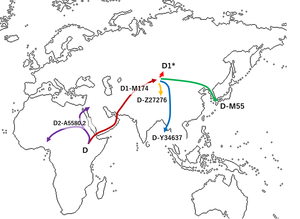Haplogroup D-Z27276
| Haplogroup D-Z27276 | |
|---|---|
| Possible time of origin | 30,000-40,000YBP[1] |
| Possible place of origin | East Asia |
| Ancestor | (Grandparent)D |
| Descendants | D-M15, D-P99 |
| Defining mutations | Z27276, Z27283, Z29263 |
| Highest frequencies | Tibetans |

Likely migration route of haplogroup D according to Haber et al. 2019

Migration route of haplogroup D
Haplogroup D-Z27276 also known as Haplogroup D1a1 is a Y-chromosome haplogroup. It is one of two branches of Haplogroup D1, one of the descendants of Haplogroup D. The other is D-M55 which is only found in Japan.
This group is found in about 46.6% Tibetan people.[2] It branched off D-M55 35,000-40,000 years before present or already 53,000 years before present.[1][3]
One sample of a subgroup of D-Z27276 was also found among ancient samples of the Koban culture between Russia and Georgia.[4]
Phylogenetic tree[]
By ISOGG tree(Version: 14.151).[5]
- DE (YAP)
- D (CTS3946)
- D1 (M174/Page30, IMS-JST021355, Haplogroup D-M174)
- D1a (CTS11577)
- D1a1 (F6251/Z27276)
- D1a1a (M15) Tibet, Altai Republic, Mainland China
- D1a1b (P99) Tibet, Mongol, Central Asia, Altai Republic, Mainland China
- D1a2 (Z3660)
- D1a2a (M64.1/Page44.1, M55) Japan(Yamato people、Ryukyuan people、Ainu people)
- D1a2b (Y34637) Andaman Islands(Onge people, Jarawa people)[7][6]
- D1a1 (F6251/Z27276)
- D1b (L1378) Philippines[8]
- D1a (CTS11577)
- D2 (A5580.2) Nigeria, Saudi Arabia, Syria[9][10]
- D1 (M174/Page30, IMS-JST021355, Haplogroup D-M174)
- D (CTS3946)
References[]
- ^ a b Shi, Hong; Zhong, Hua; Peng, Yi; Dong, Yong-li; Qi, Xue-bin; Zhang, Feng; Liu, Lu-Fang; Tan, Si-jie; Ma, Runlin Z; Xiao, Chun-Jie; Wells, R Spencer; Jin, Li; Su, Bing (October 29, 2008). "Y chromosome evidence of earliest modern human settlement in East Asia and multiple origins of Tibetan and Japanese populations". BMC Biology. BioMed Central. 6: 45. doi:10.1186/1741-7007-6-45. PMC 2605740. PMID 18959782.

- ^ Michael F Hammer; Tatiana M Karafet; Hwayong Park; Keiichi Omoto; Shinji Harihara; Mark Stoneking; Satoshi Horai (2006). "Dual origins of the Japanese: common ground for hunter-gatherer and farmer Y chromosomes". Journal of Human Genetics. 51 (1): 47–58. doi:10.1007/s10038-005-0322-0. PMID 16328082.
- ^ Mondal, Mayukh & Bergström, Anders & Xue, Yali & Calafell, Francesc & Laayouni, Hafid & Casals, Ferran & Majumder, Partha & Tyler-Smith, Chris & Bertranpetit, Jaume. (2017). Y-chromosomal sequences of diverse Indian populations and the ancestry of the Andamanese. Human Genetics. 136. 10.1007/s00439-017-1800-0.
- ^ Boulygina, Eugenia; Tsygankova, Svetlana; Sharko, Fedor; Slobodova, Natalia; Gruzdeva, Natalia; Rastorguev, Sergey; Belinsky, Andrej; Härke, Heinrich; Kadieva, Anna; Demidenko, Sergej; Shvedchikova, Tatiana (2020-06-01). "Mitochondrial and Y-chromosome diversity of the prehistoric Koban culture of the North Caucasus". Journal of Archaeological Science: Reports. 31: 102357. doi:10.1016/j.jasrep.2020.102357. ISSN 2352-409X. S2CID 218789467.
- ^ "2019-2020 Haplogroup D Tree".
- ^ a b c d e f g h i j k l m n o p q Y-Full
- ^ Thangaraj K, Singh L, Reddy AG, Rao VR, Sehgal SC, Underhill PA, Pierson M, Frame IG, Hagelberg E (January 2003). "Genetic affinities of the Andaman Islanders, a vanishing human population". Current Biology. 13 (2): 86–93. doi:10.1016/S0960-9822(02)01336-2. PMID 12546781. S2CID 12155496.
- ^ Y-DNA Haplogroup D and its Subclades - 2014
- ^ Tyler-Smith, Chris; Xue, Yali; Thomas, Mark G.; Yang, Huanming; Arciero, Elena; Asan; Connell, Bruce A.; Jones, Abigail L.; Haber, Marc (2019-06-13). "A Rare Deep-Rooting D0 African Y-Chromosomal Haplogroup and Its Implications for the Expansion of Modern Humans out of Africa". Genetics. 212 (4): 1421–1428. doi:10.1534/genetics.119.302368. ISSN 0016-6731. PMC 6707464. PMID 31196864.
- ^ Estes, Roberta (2019-06-21). "Exciting New Y DNA Haplogroup D Discoveries!". DNAeXplained - Genetic Genealogy (in American English). Retrieved 2019-07-08.
Categories:
- Human Y-DNA haplogroups
- Bioinformatics stubs
- Genetics stubs